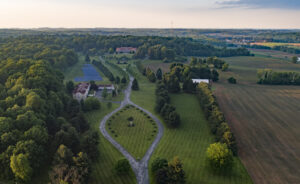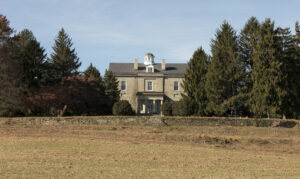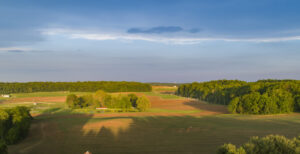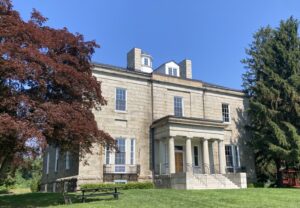The story of Carrollton Hall precedes the laying of any stone. The land on which Carrollton Hall sits was first stewarded by Native American tribes – the Piscataway and Susquehannock.
By the early 18th century, some 10,000 acres around Carrollton Hall was owned by the Carroll Family, beginning with Charles Carroll the Settler, and was used for plantation farming, largely with enslaved laborers. Charles Carroll the Settler’s grandson, Charles Carroll of Carrollton, signer of the Declaration of Independence, gave 1,000 acres of the family’s Doughoregan property to his granddaughter, Emily McTavish in 1831. Her son, Charles Carroll McTavish was the last direct family member to own the property. He sold the property in 1864 to Charles Dougherty.
From 1867 until 1910 Carrollton Hall was largely uninhabited as it passed through a series of mostly absentee owners, though it may have been used as a summer home intermittently. The farm was being run by the Brosenne family, as both owners and tenant farmers. In 1910, Van Lear Black, the publisher of the Baltimore Sun, took possession of the property by lease, undertook substantial improvements to the house and property, and finally purchased it outright in 1917. Black sold the property in 1924 to Morris Shapiro and Charles Lebzelter. Shapiro bought Lebzelter’s interest in the property in 1927 and then subdivided it, selling a large portion to the Franciscan Friars Conventual the next year.
Stewardship by the Friars
The friars have owned the property since 1928. Carrollton Hall was used, among other things, as a novitiate and headquarters for preaching friars. The friars began restoration work in 2016 to preserve the historic features of the house in preparation for opening the site to the public.
Carrollton Hall continues to reside on property owned and stewarded by the Franciscan Friars Conventual of the Our Lady of the Angels Province. The friars own and maintain 236 acres of farmland, walking trails, and spaces designed for prayer and reflection. Carrollton Hall serves as a space to examine the historical roots of the social and racial inequalities we see in our communities today.

Folly Quarter
Carrollton Hall resides on property owned and stewarded by the Franciscan Friars Conventual of Our Lady of the Angels Province.

Enslaved Communities
While under the ownership of the family of Charles Carroll of Carrollton, most inhabitants of this historic site were enslaved and free African Americans.

The First Inhabitants
Native American tribes are essential to the story we tell at Carrollton Hall as the first stewards of this land.

The McTavish Family
Emily Caton McTavish was the granddaughter of Charles Carroll of Carrollton. Carrollton Hall was built for her and her husband.
